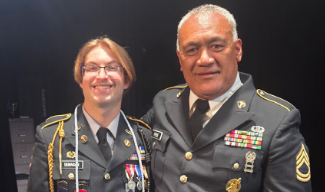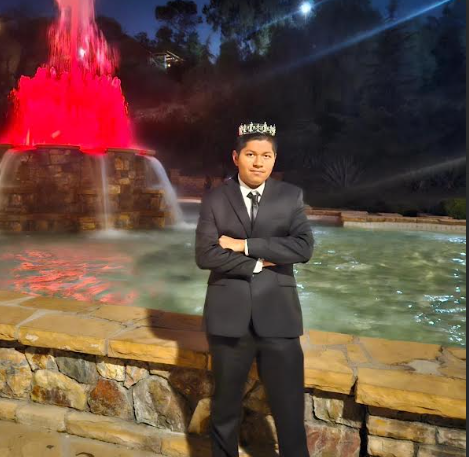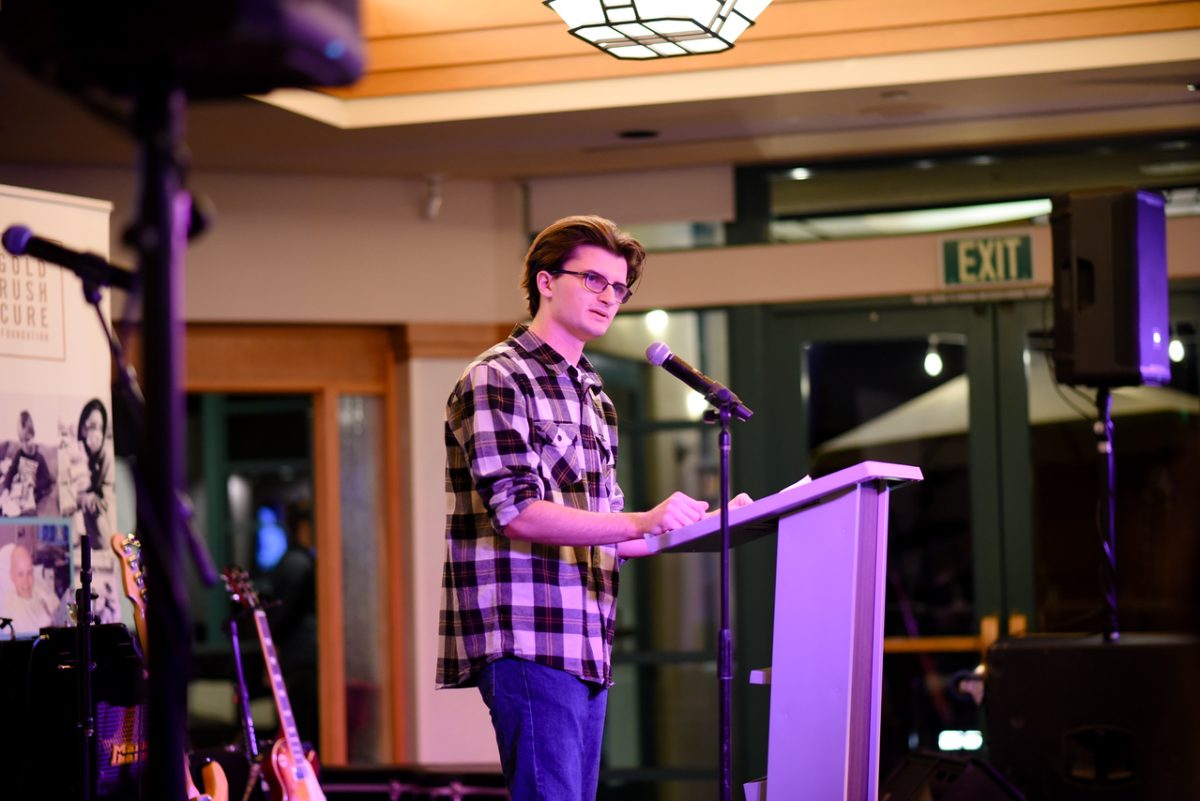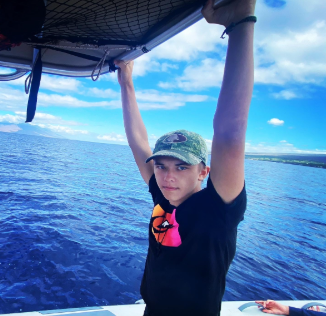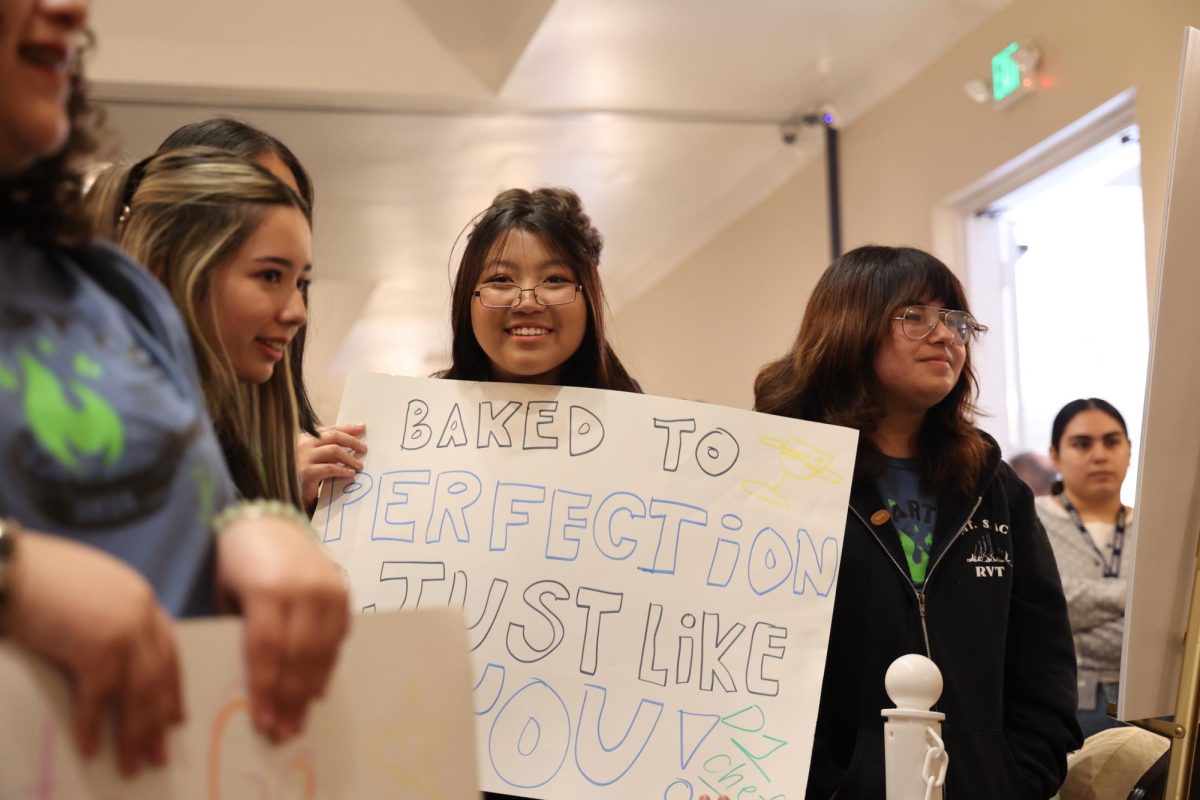DETERMINATION: Class of 2024
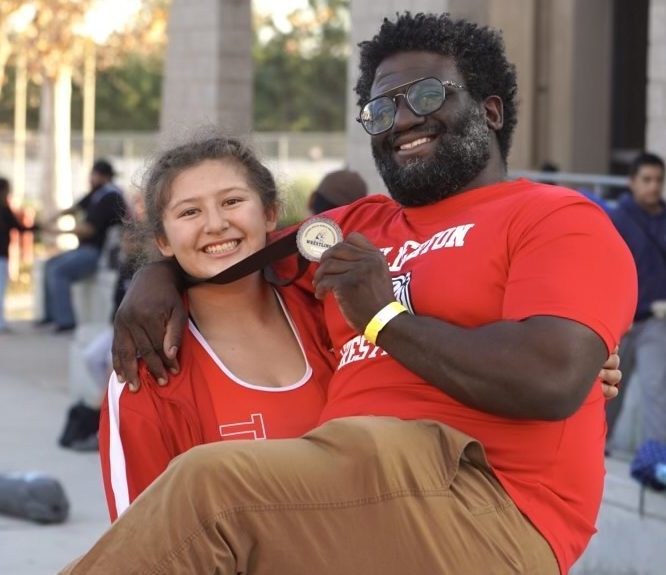

It all started with an email. Freshman Dakota Stout reached out to the journalism class, asking us to write a feature about senior Levi Burrell. She wrote: “I met Levi when she was in Colorguard. She would be patient with me as I have autism. She would deeply explain things making sure I understood. Levi cried with me when she said I’m beautiful and told me not to care what others think which helped me gain my confidence. She is my idol.”
Wow. I mean, sure we get story suggestions once in a while but to receive such a heartfelt, sweet recommendation was new. We were happy to put Levi’s name on the senior feature list; after all, we knew she was having an awesome wrestling season, so it would be a great story.
We approached the feature in typical fashion: gather some wrestling stats, talk to a few friends. But we soon learned that underneath all of her accomplishments was hardship. It’s my third year in journalism and sometimes I think I know what the story is. This time I was wrong. Because this isn’t just Levi’s story. It’s the story of a beloved sister who was sex trafficked and who died from a fentanyl overdose at age 18. It’s the story of a determined mother, Carla O’Boyle, who has turned the grief over her daughter’s death into a tool to help save lives. It’s a story that perhaps explains why Levi Burrell was able to find the compassion to connect with a struggling freshman with autism. And this is the story about how she found the grit to stay strong through adversity.
Sometimes stories are messy and complicated, but they’re the ones worth exploring. I couldn’t write this story alone. I’m grateful to opinion editor Elie Chung for tackling this project with me. We’d like to thank Kristi Boogaard from Project CHOICE for educating us about human trafficking. We’re both grateful that Levi and her mom allowed themselves to be vulnerable. They hope by sharing their story, they can help others.
So do we.

Senior Levi Burrell always looked up to her sister Rianna who was four years older than Levi. Rianna was the ideal student when she attended Buena Park High School: four-year varsity cheerleader, straight-A student, water polo player, swimmer and martial artist in karate. She was kind and planned to pursue psychology. All it took was one bad person to change the trajectory of her life.
After Rianna’s senior year, she met a man she trusted. After getting to know Rianna’s personal information, including details about her family, he transported Rianna to San Diego where she was sex trafficked.
Levi explains that kidnapping isn’t always about geography; her sister Rianna was trapped by fear. “The guy kind of got to know her and then pulled it on her, threatened her that if she didn’t comply he would hurt my family and me,” Levi said. She says it’s upsetting to know her sister was being sexually abused but even worse to realize that one reason Rianna thought she couldn’t escape was to protect Levi.
To hide the fact that Rianna was being trafficked, her pimp actually allowed her to visit home occasionally. Levi and her family would later learn that Rianna was too afraid to escape the relationship. Her trafficker’s threats kept her silent.
Levi and Rianna’s mother, Carla O’Boyle said in a phone interview that human trafficking is not like other abuse. “The abuse they suffer is more mental and emotional,” O’Boyle said.
O’Boyle says that Rianna told her that the time with her captor was filled with sexual and mental torture. She complied with her captor because she was with another victim, who would be harmed if Rianna retaliated. Through it all, she tried to remain hopeful that one day the two of them would be freed. But it seemed nearly impossible. When Rianna met another man she thought she could trust, she mustered up the courage to tell him that she was being trafficked. Instead of finding an ally, Rianna had another abuser. According to O’Boyle, the man whom Rianna thought she could trust told her captor, “Does your bitch tell every guy her life story?” and the pimp ended up choking out the other girl. “The way that he controlled Rianna was not by abusing her, but by abusing the other girl that was there with her,” O’Boyle said.
In another instance, Rianna told her mom that she and the other girl fled to a nearby liquor store and before she could even reach out for help, the clerk recognized the other victim. He jokingly asked how much Rianna would cost and at that moment Rianna knew that many locals knew of the sex trafficking.
Rianna’s family was unaware of the situation. Although they noticed small changes, the changes weren’t too drastic for them to catch on. On Thanksgiving, Rianna was at home with her family celebrating the holiday, but her pimp contacted her and forced her to leave her home for another assignment. Rianna’s mother was determined to keep her home for the holiday, but after an argument arose, Rianna left. No one knew the situation until a family friend recognized the warning signs that Rianna was being trafficked. The family began to track her down, and eventually her pimp was arrested.
But even after her captor’s arrest, Rianna struggled to adjust to normal life. She had contracted some STIs, and the diseases were just another reminder of her time being trafficked.
“She would wake up screaming, and she would have really bad PTSD from being trafficked,” Levi said.
Compounding her stress, Rianna had to continuously see her abuser in court. “She faced her accuser in trial and she was the only girl out of all the girls,” O’Boyle said. “It was really sad because when they had offered him a deal, he refused to take the deal while she was still alive because he didn’t want to register as a sex offender.”
O’Boyle says that’s when Rianna turned to drugs, specifically Percocet. Throughout high school, Rianna was heavily against drugs because she saw the effects it had on her family members. However, Percocet was the only outlet that gave her some peace.
Levi said her sister was very weak when she took a Percocet laced with fentanyl. “My sister stopped eating after everything that happened, so she became smaller than a size zero. The fentanyl was very strong, and her body mass wasn’t enough to handle it,” Burrell said. “She didn’t know that it had fentanyl in it. It was just one pill that she took.”
According to O’Boyle, her daughter was with friends when she took the fatal pill on Aug. 5, 2020. “Her friends panicked and didn’t want to be held accountable, so they drove around instead of taking Rianna to the emergency room. She died at 18 years old, only six days from turning 19.”
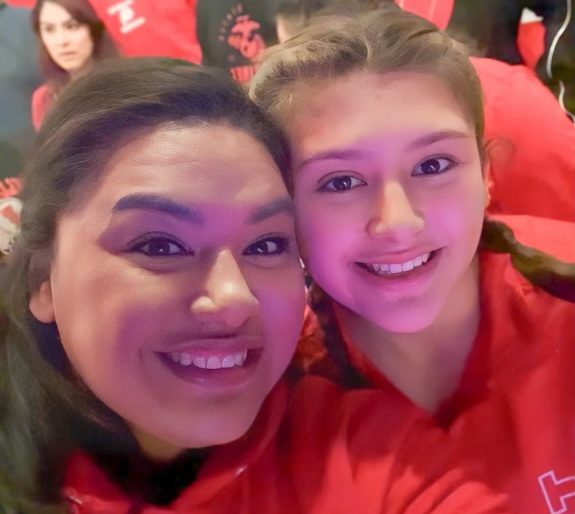
Rianna died just a few days before Levi started her freshman year of high school. Classes were hosted entirely online that quarter. Compounding her stress, Levi had to stay away from her family members who had contracted COVID. So in addition to losing her sister, Levi had to grieve alone in her room while trying to start school. It’s not a surprise that school was a struggle.
After her sister died, Levi said she felt numb and struggled to find the motivation to attend online school.
“I tuned out. I just did what I could to get through my freshman year. My mom didn’t talk to me for three months. She did not look at me. The very sight of me reminded my mom of my sister,” Burrell said. “The next three months after that were horrible too because it was all just continuous arguing and fighting. I had to learn how to help myself through that entire process.”
Burrell said she slowly found comfort in color guard her freshman year.
“With everything that happened, I got really anti-social. I got really closed off. I didn’t want to talk to people. I was really scared and insecure,” Burrell said. “Joining color guard kind of really gave me that extroverted feeling. I became more comfortable in my own skin.”

Above all, what allowed Burrell to cope most with the death of her sister was wrestling. Burrell had no wrestling experience when she joined her junior year. Now she is an individual Freeway League champion in her weight class.
When Burrell first joined, she said she didn’t enjoy it.
“I actually cried to my mom. I was like, ‘I don’t know if I want to do this.’ And then literally that day she took me to Dick’s Sporting Goods and got me three sets of outfits,” Burrel said. “She told me I wasn’t quitting. I’m glad I didn’t.”
At the beginning of her wrestling career, Burrell was teased for her inability to execute certain moves. The teasing got to Levi, but instead of allowing her daughter to quit, Levi’s mom Carla O’Boyle took her to a club called Silverback where she trained for the remainder of the summer.
“That day, my mom looked on her phone and she came to my room and she said 10 minutes after I got home, ‘Get your shoes on, we’re leaving.’ And I was like, ‘what, where are we going?’ She then took me to the club to start training,” Burrell said.
After her summer of training at Silverback, Burrell came back prepared for her senior wrestling season. There, with the help of coach Jaysen Baxter, Burrell quickly worked her way up the ranks with strengthening moves she already knew and by developing new ones such as her signature hiptoss.
“Baxter was a different coach because he wanted to look at us wrestling first and then we would decide from there our style. Your style affects what a coach teaches you and what they won’t teach you,” Burrell said. “I really like that about him. Coach Baxter knew that I tossed, so he gave me counter-moves. He built off of what I had and made it stronger.”
Baxter said: “She didn’t have an understanding of a lot of things, but she was so eager to get at it and ready to compete. For the little bit of time that she had been wrestling, she had found the things that she was very good at and utilized them very well.”
Baxter said Levi’s determination allowed her to pick up skills and finish 4th in the CIF Individual Championship. Burrell was one of only four wrestlers who qualified for the Masters in Palm Springs and she was one match away from qualifying for State, all while being injured.
“It’s almost unheard of for someone to make it even to Masters their first year let alone if she had made it to State. That would have been amazing. It’s insanely rare,” Baxter said.
Burrell said wrestling is more of a lifestyle than a sport and has allowed her to grow as a person in mental strength and resilience.
“It’s crazy how powerful it is when you go into a match thinking with a positive mindset. I’m going to win this. I’m gonna get better. I’m gonna do this in comparison to I don’t know how I feel about this. I’m really nervous right now,” Burrell said. “You have to shut those down and really trust yourself. You have to have more confidence too. It’s everything. It’s the way you talk to people. It’s the way you walk. It’s the way you are.”
Levi’s mom said that her daughter was a good fit for wrestling but more importantly Levi brought sportsmanship to the mat.
“There’s been multiple meets where she’s wrestling, but she notices that there’s another person from a different school that’s either been mistreated or is crying and she goes over there and she comforts them,” O’Boyle said. “She’s compassionate and empathetic. She makes sure that they feel valued.”
Baxter said sometimes in sports, athletes are expected to remain stoic and reserved, especially in wrestling. However, he said what distinguishes Levi as a wrestler is her strength to be vulnerable.
“If Levi’s going to cry, she’s definitely going to cry, whether it’s happiness or sadness or excitement, things like that. That energy is super important. You love to see it as a coach,” Baxter said. “She’s open with her feelings—whatever struggles she’s had—and it always gives a great opportunity for guidance. She’s been one who’s been very open to criticism, growing and becoming a better person in whatever aspect.”
Burrell said through her difficult circumstances she has developed a sense of gratitude.
“I could have become an asshole, and I could have snapped at everybody when my sister passed away. I could have developed a really big ego for wrestling and been a total jerk. I could have taken every single thing bad and used it as an excuse to be unsuccessful,” Burrell said. “But instead I kind of used it to keep pushing forward. That’s why I’m here. That’s how I am the way I am.”

Along with wrestling, Levi has a background in speech and debate, including qualifying for nationals when she was an eighth grader at Nicolas Junior High. She was enrolled in speech during high school but did not compete. Instead, speech and debate teacher Tarin Almstedt allowed her to write and present her speeches in class.
“I ended up writing a speech about my sister’s sex trafficking story to spread awareness because that was originally what I wanted to perform outside of the classroom,” Burrell said.
Despite being unable to present her speech to a larger audience, Burrell’s efforts weren’t in vain as the story of her sister is still used to spread awareness. Specifically, her mother Carla O’Boyle, a nurse and hospital administrator, has been retelling Rianna’s story to hundreds of medical professionals. Despite O’Boyle being in the medical industry, her own daughter wasn’t safe from being trafficked. Her story shows that anyone can be a victim and they need to be heard and helped.
As a Magnet nurse at the Kaiser Permanente Downey Medical Center, O’Boyle has worked to implement policies to help identify patients, especially those in the emergency room, who might be sex trafficked victims. O’Boyle joined HEAL Trafficking, which is an organization made up of medical professionals spreading awareness and reducing cases of human trafficking. Through HEAL Trafficking, O’Boyle was able to present cases she had witnessed as a nurse, including her own daughter’s story.
It was only after Rianna’s death that the trial against the human trafficker went forward. As O’Boyle was grieving the loss of her daughter, the court officials told her that they could not force the trafficker to register as a sex offender.
“I remember I was so devastated because I was like, how is this justice?” O’Boyle said. “I said, ‘Can I please talk to the district attorney? Let me plead to him.’”
The district attorney eventually offered a deal to the trafficker resulting in a 10-year prison sentence and the requirement of officially registering as a sex offender.
Although the circumstances of the trial changed, one thing still remained; O’Boyle’s daughter was dead. In part, that is why her mission is to help others and spread awareness concerning human trafficking.
A common misconception is that human trafficking isn’t a problem in the United States. It is. California has 12% of the human trafficking cases according to the National Human Trafficking Hotline. According to the Orange County Human Trafficking Task Force, in Orange County alone, there were 420 human trafficking victims identified between 2021-2022. 90% of the victims in Orange Country were female and 30% of the victims were female minors.
What’s worse is that these numbers aren’t even the majority of possible victims in Orange County. Typically only 1% of human trafficking victims are identified according to the United States Department of Health and Human Services. Most of them aren’t hidden from the public eye. Just like everyone else, they go out to stores and doctor offices, but the shame and helplessness they feel prevents them from reaching out for help.
“They’re scared that they’re going to go to jail because they technically prostituted,” O’Boyle said. “But if they can’t consent to sex, then they’re not going to be held responsible. There was a Senate bill that passed last year that made human trafficking of a minor a serious felony as well as a strike offense, which is really helpful for our cases.”
Oftentimes, traffickers find potential victims through social media, shopping malls, bus stops and schools. Be cautious if someone offers something that’s too good to be true (boyfriend/girlfriend, presents, or attention). Traffickers will do anything to make sure that victims stay with them including establishing a romantic relationship, drugging them, or using blackmail, violence or threats.
Using the Epic System—a medical record software—O’Boyle hopes to implement a trafficking victim screening system by asking questions about possible clues and hints of a victim’s situation.
“It’s just to make sure that we’re giving out resources so that [victims] are able to do something about leaving. We don’t want to scare anybody off either,” said O’Boyle, who explained that traffickers often take their victims to emergency rooms but refuse to leave them alone with healthcare workers. The key, she says, is to have a system that asks the right questions and to create an environment that gives a victim the opportunity to get help.
Even though many hospitals and medical centers already have the Epic System, O’Boyle is working to improve the screening tools and to train the staff to spot potential warning signs that someone might be in trouble.

O’Boyle says she wishes her daughter had had more resources to help her cope such as Project CHOICE that helps sex trafficking victims. The program was founded by the Orangewood Youth Center and focuses on giving victims, or clients, the choice to take any resources that they provide including safety planning, housing referrals, court support, and advocacy.
Kristi Boogaard is the clinical supervisor of Project CHOICE and her job consists of teaching her staff on how to meet a client’s needs. “We’re talking about reproductive health. We’re talking about substance use. We’re talking about social media and we’re not telling the youth don’t do it. We’re saying do it safely and that’s the difference between an abstinence program and a harm reduction program,” Boogaard said.
When Boogaard was working as a high school teacher, she noticed the behavior of certain students and was concerned about their home life. She eventually got to work at a group home, Crittenton, which houses youth ages 14-17. Boogaard realized that many of them were being trafficked.
“At the group home, I started learning about the trauma of human trafficking and exploitation. A lot of the kids would complain about their county social workers, that their county social workers didn’t care, that they didn’t spend enough time with them,” Boogaard said.
She wanted to make a change for the foster youth and to protect them from being exploited, so she focused on becoming a social worker. But once she began her career as a social worker, she realized that the youth were right: she couldn’t spend enough time with her clients. Despite doing her best, she couldn’t make the change that she wished to make. That was until she looked into Project CHOICE.
“When this position opened, this was my dream. We’re really building relationships with the youth,” Boogaard said. “We get to slow down, ask the youth how their day is and be that consistent focus. And we’re a choice. It’s a choice to be here. And as a county social worker, they have to see you, so it’s a different vibe.”



